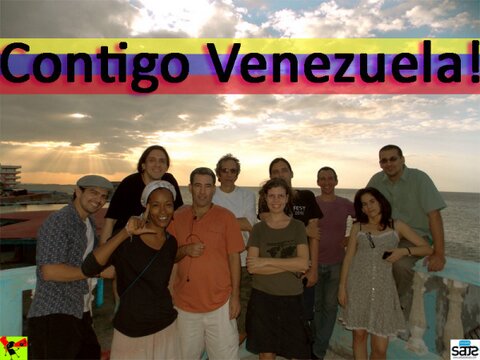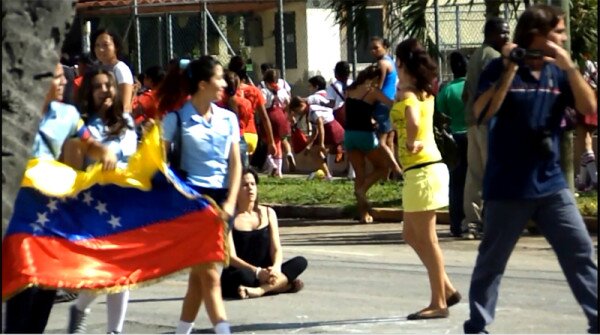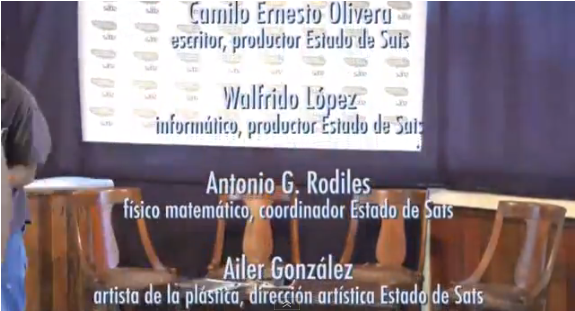Category: Estado de Sats / State of Sats
GUSANO (Worm) – A Video from Estado de SATS
If the video doesn’t appear try this link.
If you don’t see the subtitles — start the video and then, on the bottom right, there will be a little “CC” box. Click there and ENGLISH will appear and the subtitles will show up. If an ad appears on the screen, close it and the subtitles will move to the bottom of the screen.
Site manager’s note: This video was translated and subtitled by the most amazing group of young people in the world… their names are on the final credits… our thanks to them are IMMEASURABLE and UNPAYABLE… but some day… in a free Cuba… sitting on the wall of the Malecon… we’ll celebrate together what you helped to bring about.
A Moment of Zen in the Midst of Chaos / Ailer Gonzalez [Video]
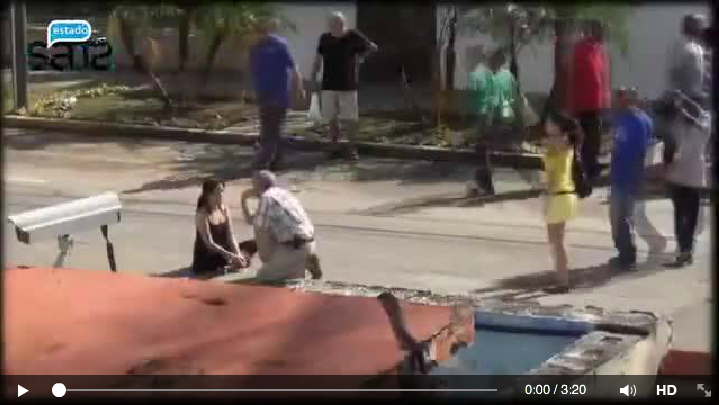
After the violent arrest of her husband, Antonio Rodiles, at the Human Rights Conference sponsored by Estado de Sats, Ailer Gonzalez chose a moment of non-violence in the midst of the madness. As children, still in their uniforms and taken out of school to spend the day harassing human rights advocates swirled around her, Ailer sat quietly under the Havana sun…
Note: At the beginning of the video in the bottom left Antonio’s mother (green dress and cane) can be seen walking back to the house after the arrest with one of the conference participants who then turns back to talk to Ailer. The other adults in video are primarily plainclothes State Security agents working for the Ministry of the Interior. The flag the children are waving (other than Cuba’s) is Venezuela’s.
Ailer Gonzalez Sitting in Protest / Lia Villares
Repression at Estado de SATS (Video)
This video was taken in the street outside the home of Antonio Rodiles, which is also the headquarters of Estado de SATS, where a Conference on Human Rights was being held in honor or World Human Rights Day.
The man in the blue shirt with glasses is Antonio Rodiles, director of Estado de SATS. The woman appearing next to him in a black dress early in the video, and sitting on the street later in the video, is Ailer Gonzalez, Antonio’s wife and also one of the active coordinators of Estado de SATS. The older woman in the long green dress holding a cane is Antonio’s mother.
The children (in and out of school uniform) were taken out of school to spend the day “repudiating” the Estado de Sats Human Rights Conference (a government spokesperson claimed they were having a “sports day” on this residential street and that Antonio was abusing the children when he was arrested).
Released! / Ailer Gonzalez
Photos and Video of Human Rights Day Repression Against the Ladies in White and Estado de SATS

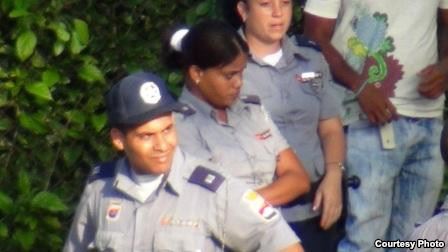
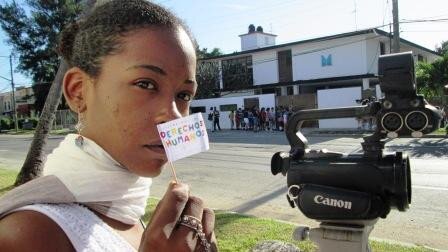
The following video shows the violent arrests of Ladies in White and the scene in front of Estado de SATS, with a short interview of Antonio Rodiles inside the conference.
11 December 2013
Antonio Rodiles Arrested With Extreme Violence / Estado de SATS
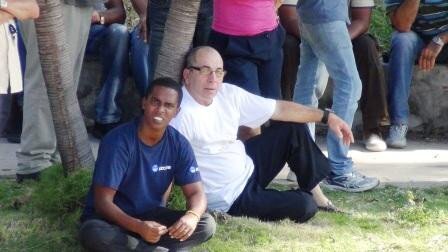
From www.cubanet.org.- Agents of the State Security (the political police) just kidnapped Antonio Rodiles, leader of the independent social-cultural group Estado de SATS, using extreme violence, according to what could be learned from the activist and journalist Camilo Ernesto Olivera. Rodiles stepped a few yards off his property to ask some schoolchildren to stop painting signs on the street against the attendees of the Human Rights Conference being held at house beginning yesterday.
There was an altercation with the police and State Security rapidly stepped in. As Rodiles was being detained his wife and his mother, Ailer Gonzalez and Gladys Fernandez respectively, protested and were surrounded by the government demonstrators, children and adults.
Then began a typical act of repudiation (insults and expletives) like those held in the early 80s against those leaving the country. At the time of this writing the two women remain under siege.
On the closing day of the First International Conference on Human Rights being held in Rodiles’ home, the house remained surrounded and the use of children as political mediators, with songs, music and government banners, continued. Camilo Ernesto Olivera underscored how unfortunate it is that the State gets involved in this situation to block the Conference.
The Washington Post carried an editorial in support of the Rodiles: Antonio Rodiles boldly confronts the Castro regime
11 December 2013
Antonio Rodiles’ House Besieged at Dawn / Augusto Cesar San Martin, Camilo Ernesto Olivera
 HAVANA, Cuba December 10, 2013, Augusto César San Martín / www.cubanet.org.- The home of Antonio Rodiles, leader of the independent group Estado de Sats, which from today through tomorrow is celebrating the First International Conference on Human Rights, was besieged by the police and plainclothes agents as the sun rose this morning. Third Street, from the Copacabana Hotel, is closed.
HAVANA, Cuba December 10, 2013, Augusto César San Martín / www.cubanet.org.- The home of Antonio Rodiles, leader of the independent group Estado de Sats, which from today through tomorrow is celebrating the First International Conference on Human Rights, was besieged by the police and plainclothes agents as the sun rose this morning. Third Street, from the Copacabana Hotel, is closed.
Around nine o’clock in the morning, this reporter was able to see a strong force deployed with the purposed of blocking political opponents, both from within the island as well as those who have managed to come from abroad, from participating in the day.
The director of Estado de Sats and the For Another Cuba campaign has said that this is the first attempt to organize an event of this kind, in which the topic of ratification of the UN covenants on human rights, signed by the Cuban government, will be addressed.
This reporter, in a taxi, tried in vain to reach the house, located in the Miramar neighborhood. The car was diverted. From 3rd and 42nd Streets the police are directing traffic. There are agents on the corners, with civilian staff. State Security cars and minibuses are located at the intersections.
The front of Rodiles’ house is deserted because 1st Street is closed. Cars coming from the Copacabana Hotel are diverted.
The Social/Labor Circle adjacent to Rodiles’ house has speakers playing the music of regime supporter Silvio Rodriguez very loudly. The audio can be heard from 3rd Street.
The few participants who were able to reach the house days earlier have not been able to leave to avoid being arrested. Among them is the troubadour Boris Larramendi, from the Cuban group Habana Abierta (Open Havana), based in Spain.
Larramendi traveled specifically for the meeting and will close the event tomorrow, December 11.
The event from within
HAVANA, Cuba, December 10, 2013, Camilo Ernesto Olivera / www.cubanet.org.- Ultimately, and contrary to expectations, there was no direct police action against the organizer, Antonio Rodiles, who yesterday was accused of a traffic violation that he, in fact, had not committed. The initial session of the First International Conference on Human Rights was held without incident.
The turnout from the public has not been as expected, only twenty participants have managed to arrive, almost none from outside the country. But the foreign media and embassies accredited on the island, such as Spanish Television, have been able to report on the event.
The first panel, led by researcher Walfrido Lopez, was on human rights and the new media. Lopez presented a video on media from abroad which follow Cuba with interviews with directors and newspaper editors
Coming up is a panel on human rights in Latin America, and the another on institutional violence against women in Cuba.
There will also be an exhibition of posters of the event and for tomorrow a concert with Boris Larramendi troubadour, who came from Madrid.
As interference, the government, through State Security and its mass organizations, has mounted a kind of Street Plan in front of Rodiles’ house. They have staged a party with music and snacks for neighborhood children, who did not attend classes today, to justify closing the street to traffic.
Also, the social / labor circle known as La Copa (The Cup), located on 1st and 42nd Streets is being used as the command post by the political police.
Since early morning they have been playing the songs of troubadours who support the government, Silvio Rodriguez and the duo Buena Fe.
The operation recalls the era of General Abrantes, the Interior Minister in charge of acts of repudiation against citizens trying to leave the country. The siege techniques are the same except that no one is throwing eggs.
10 December 2013
The Henchman Camilo Is Leading the Repression Against Human Rights Day
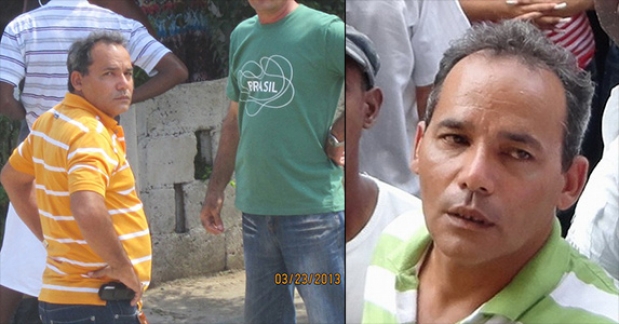
State Security showed up at home of Antonio Rodiles, leader of Estado de SATS, and tried to arrest him to avoid the celebration of the events for Human Rights Day.
[Tuesday] the First International Event For the UN Covenants will begin, organized by Estado de SATS, an event that forms a part of the of the For Another Cuba Campaign, and includes panels, audiovisuals, an exposition titles “Art and Human Rights,” performances and a closing concert.
The agents tried to handcuff him and take him to the police station, supposedly for violating traffic laws. The event participants confronted the uniformed offices to block the arrest.
Rodiles had gone to pick up a collaborator. On the way there he saw Agent Camilo, known for the cruelty of his methods against the opposition, who ordered the police to arrest him.
The police left the dissident’s house, apparently to get an arrest warrant.
From Diario de Cuba, 9 December 2013
Letter from Antonio G. Rodiles to Raul Castro / Antonio Rodiles
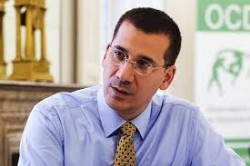 Letter from Antonio G. Rodiles to Raul Castro
Letter from Antonio G. Rodiles to Raul Castro
Havana, December 6, 2013
Mr. Raúl Castro Ruz,
My name is Antonio Enrique González-Rodiles Fernández, Cuban citizen, resident of Ave 1ra. Number 4606 in the municipality of Playa, Havana. I studied physics at the University of Havana and later earned the titles of PhD Candidate in Physics and Masters in Mathematics from the National Autonomous University of Mexico and Florida State University, respectively. After 12 years living outside my country, I decided to return with the idea of being part of a process of change that will help us out of the disastrous situation in which we live.
In the summer of 2010, as a result of these concerns and with a group of friends, artists, intellectuals, activists, Estado de SATS was developed, a civic and cultural project that proposes through art and thought a public space for free debate of ideas and views about our nation.
The project has been carried out in my own home for three years, given the impossibility and refusal of the authorities to accommodate it in a public space or institution. Since its inception, dramatic police operations around my house, accompanied by beatings and arbitrary arrests against the attendees, have been a constant.
My family and I have received multiple threats and pressure including my being beaten by several State Security agents and detained this November for 19 days for the supposed crime of resistance. The authors of this violation continue to commit the same abuse with impunity.
Last week two of the tires on my car were punctured and a chemical liquid with a terrible stench was poured on the seats, as stated in Complaint number 66804 filed on November 26 at the 5th Station of the People’s Revolutionary Police (PNR) in the municipality of Playa.
Just two days ago urine was thrown on the front seats and, to all of this, is added the warnings that we have been sent of possible acts of repudiation to block an event we are going to hold on December 10 and 11, celebrating the 65th anniversary of the Universal Declaration of Human Rights, as part of a campaign asking for the ratification and implementation of the UN Covenants.
This event will have the same characteristics as all those we have developed previously, where a plurality of opinions and full respect for others have been our premises.
The situation we are living in is unsustainable, after 54 years of running the country on whims, violations and abuse, the result screams before our eyes. Every individual who dares to publicly express their disagreements is destined to be treated in a degrading and humiliating way with no possibility of appeal to any authority.
The deplorable acts of repudiation, managed through groups of vigilantes, all the abuses of power and the legal violations committed, keep Cuban citizens in a state of total defenselessness. The great irresponsibility and excessive ambition of those who now govern will lead our nation to an even greater debacle.
With this I mean not only to emphasize the complex situation in which we live, but to make clear my total commitment to the construction of a nation based on respect for the fundamental rights and freedoms of all Cubans. It is impossible to remain indifferent before a power that systematically ignores the dignity of its citizens and its own laws, with total impunity. A power that orders its representatives to act as common criminals.
Those who have the reins of power in their hands also carry the major responsibility for the course of coming events. It is impossible to remain indifferent to the violations and abuse.
6 December 2013
First International Meeting on Human Rights and UN Covenants / Estado de Sats, For Another Cuba
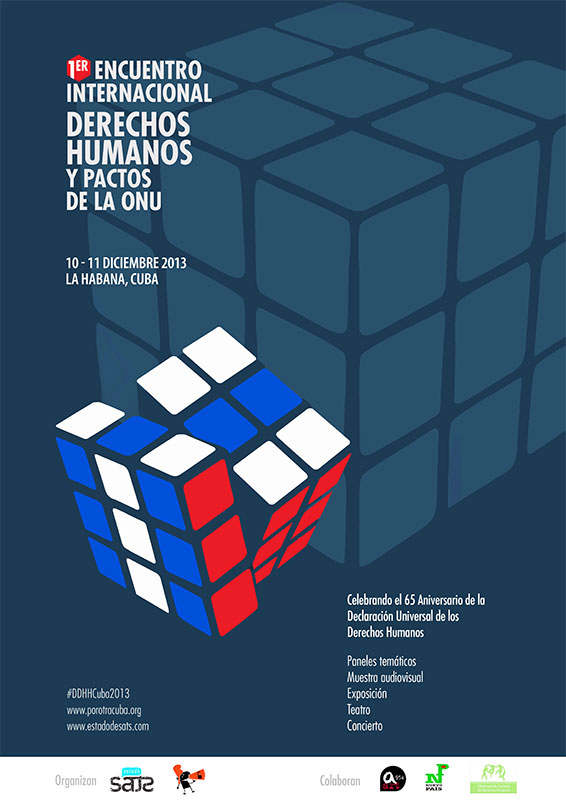 The independent Estado de SATS project in collaboration with New Country Forum and the Cuban Human Rights Observatory (OCDH), invites invites artists, intellectuals, activists and defenders of human rights to participate in the First International Meeting on Human Rights and the UN Covenants as a part of the Campaign for Another Cuba and the 65th Anniversary of the Universal Declaration of Human Rights.
The independent Estado de SATS project in collaboration with New Country Forum and the Cuban Human Rights Observatory (OCDH), invites invites artists, intellectuals, activists and defenders of human rights to participate in the First International Meeting on Human Rights and the UN Covenants as a part of the Campaign for Another Cuba and the 65th Anniversary of the Universal Declaration of Human Rights.
Our projects have worked in recent years on the creation and growth of public spaces where different perspectives on the reality and future of our nation can be discussed.
Since August 2012, along with diverse groups and activists committed to the social situation of our nation, we began the Campaign for Another Cuba. This initiative has involved an ever growing number of Cubans within and outside the island in a civic demand that the Cuban government ratify and implement the United Nations Covenants on Civil and Political Rights and Economic, Social and Cultural Rights.
At a time when Cuban civil society is growing, it is essential that there be direct exchanges among different actors within and outside the island. Holding this meeting will allow an approach through art and thought to the vital subject of human rights. Activists, artists, intellectuals and professionals — Cubans and the international community — will spend two days sharing views and experiences, in a country where such guarantees and rights are not a part of everyday reality.
The meeting will begin on 10 December 2013. The event will include subject panels, audiovisual displays, an exhibition with the theme Art and Human Rights (painting, graphics, photography, installations), performances, and a closing concert.
All are invited!
Live hashtags:
#DDHHCuba2013
#UN65
#RatificaPactos
#AbreCuba
#PorOtraCuba
You can write to info@porotracuba.org
Thematic Panels
Audiovisual Exhibition; Art and Human Rights (photography, painting, graphics, installations)
Experimental Theater and Concert Playback
Dates: December 10-11, 2013
Location : Calle 1ra 4606 between 46 and 60, Miramar, Playa .
Admission is free and open to the public.
Estado de Sats Presents “Notebooks for the Transition” in the Midst of a Police Operation
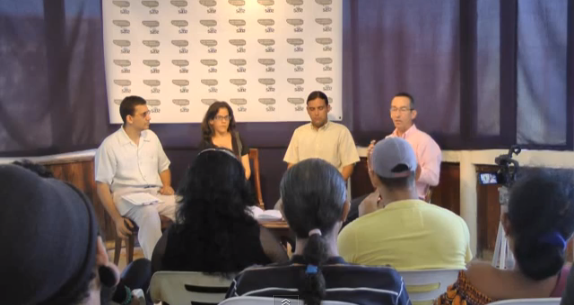 Saturday morning Estado de Sats presented the first issue of their magazine “Handbooks for the Transition” despite a political operation to prevent the audience from arriving; several activists were detained, Antonio Rodiles, director of the independent project, informed Diario de Cuba
Saturday morning Estado de Sats presented the first issue of their magazine “Handbooks for the Transition” despite a political operation to prevent the audience from arriving; several activists were detained, Antonio Rodiles, director of the independent project, informed Diario de Cuba
According to Rodiles, Gabriel Barrenechea, a member of the magazine’s editorial board, and Andrés Pérez were besieged in their homes. Meanwhile, the artist Luis Trápaga was arrested on his way to the presentation, as was José Díaz Silva, who was beaten and held at least six hours.
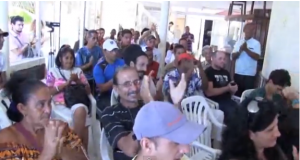 However, about 60 people managed to attend the event. Rodiles said that some participants were arrested by regime’s agents on leaving, to take copies of the magazine from them.
However, about 60 people managed to attend the event. Rodiles said that some participants were arrested by regime’s agents on leaving, to take copies of the magazine from them.
“Despite arrests, violations, pressures, we presented ‘Handbooks for the Transition.” SATS will continue because the desire for freedom us unstoppable,” insisted the director of the independent project.
The monthly magazine, in print and digital editions, “has as its objective to address different themes about the future transition to democracy on the Island, with authors from within and outside the country,” Rodiles told Diario de Cuba this week.
The first volume includes articles by Walfrido Lopez (The Internet in Cuba-US Relations), Emilio Morales (Remittances have become an engine of the Cuban economy), Juan Antonio Blanco (Civilizational and migration change), and Antonio Rodiles and Alexis Jardines (Notes for the transition), among others.
Future issues will address topics such as economic liberalization and legality.
“We must begin to discuss these issues openly. We need to debate them, without fear,” said Rodiles.
Diario de Cuba | 2 November 2013
Estado de SATS Conference on UN Human Rights Covenants / Estato de SATS
“Notebooks for the transition,” A Magazine for Discussion / David Canela Pina
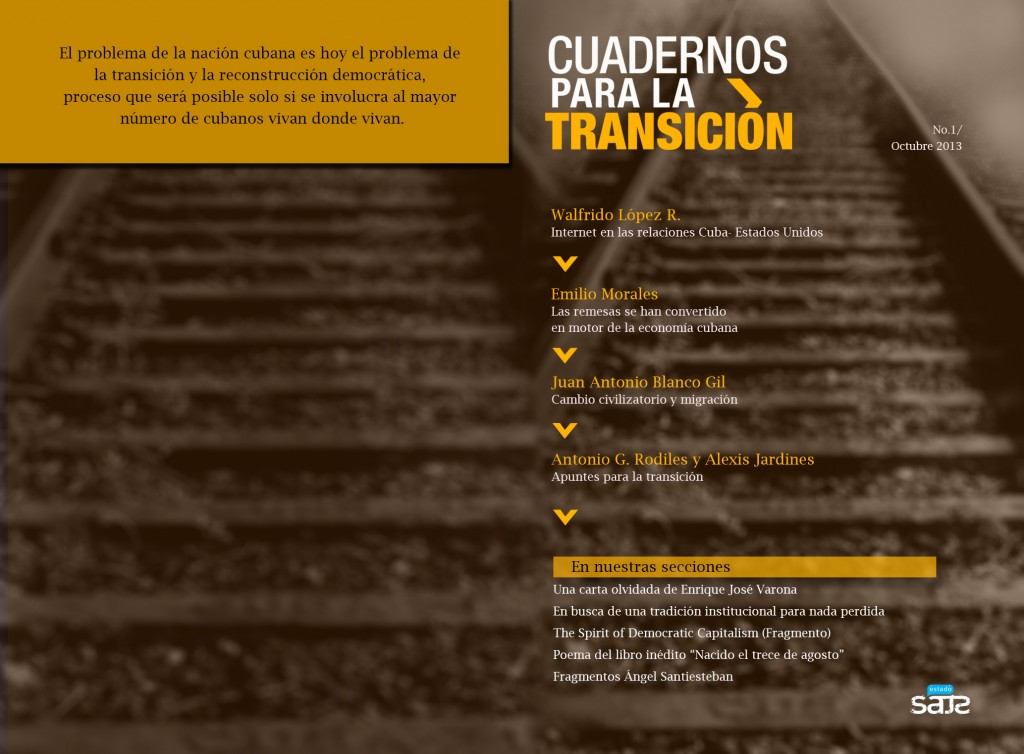 HAVANA, Cuba, November www.cubanet.org.- This Saturday morning the civic project Estado de SATS (State of SATS) presented a new magazine titled Notebooks for the Transition, which aims to “offer a forum for analysis and plural participation,” for all Cubans interested in “thinking and visualizing that other Cuba which is already urgent” according to an editorial note. It says that the first issue is “dedicated to the issue of transnationality.”
HAVANA, Cuba, November www.cubanet.org.- This Saturday morning the civic project Estado de SATS (State of SATS) presented a new magazine titled Notebooks for the Transition, which aims to “offer a forum for analysis and plural participation,” for all Cubans interested in “thinking and visualizing that other Cuba which is already urgent” according to an editorial note. It says that the first issue is “dedicated to the issue of transnationality.”
Notebooks for the Transition is a magazine produced and coordinated by the State of SATS civic project, which has had as one of its main strategies to become an ideological “bank,” where ideas and trust in this “human capital” that has been invested in other parts of the world due to the exodus of Cuban society can return. In this issue, for example, collaborators include intellectuals and artists who don’t live on the Island: Juan Antonio Blanco Gil, Emilio Morales, Alexis Jardines, Carmelo Mesa Lago, Garrincha, among others. Their presence is distant for now, but as the transition to democrat becomes more visible and effective, the process of return of many of these social actors will no longer be an event, but become a flow, that newly enriches the naitonal sap.
Presentation of Notebooks
Despite the police operation, that prevented some people from coming to the meeting site, leaving their homes, and even their provinces, as was the case of Jose Gabriel Barrenechea. More than forty people attended the launch of the first issue.

The panel that presented the details of the magazine was made up of Antonio Rodiles, overall project coordinator Estado de SATS, Ailer González, its artistic director, Camilo Ernesto Olivera, freelance journalist, and Walfrido Lopez, a computer specialist. The first three are part of the Editorial Board, along with José Gabriel Barrenechea and Alexis Jardines, who is the only member currently located outside of Cuba.
During the exhibition they addressed issues such as the integration of Cuban society, the economic and “knowledge” remittances, the leadership structures, civic maturity as a prerequisite for the conscious transition, the role of Cubans inside and outside Cuba in the new political system, etc.
Not just for regime opponents
Rodiles commented that “Cuban society is badly damaged and fragmented, so we need to bring together Cubans around a frank discussion.” And he said that in the transition to democracy “it must be not only activists and opponents, but also ordinary citizens.”
With regards to the role of the internet in building a democratic society Walfrido Lopez said that it is not enough for some Cubans to move freely on the internet, with their thousands of Twitter followers and hundreds of Facebook friends, but unable to create a network of internal communication with the Cubans on the Island.
In the current economic context, Rodiles said the “economic flow between Cuba and Miami is the centerpiece of a change in Cuba,” which is already funding private businesses, buying houses, etc. And he added that emigrant remittances provide the largest source of revenue to the national economy and today reach 62% of Cuban homes.
“The transition begins with us”
Camilo Ernesto Olivera raised the old problem of how to achieve this national unity of interest, at least within the opposition. Then he said that we must first move ourselves toward a civic consciousness and a maturity based on respect. “The transition begins with us,” he said. Rodiles, meanwhile, said that national unity should not revolve around a leader, a new Fidel Castro and called for a “polycentric opposition.” He said that “the relationship between individuals is what generates human and social capital,” and therefore “our magazine is aimed at creating those links among all Cubans.”.
With great wit, Ailer Gonzalez enunciated that “differences of opinion between the opposition do not strengthen the regime, rather they strengthen the opposition,” as they increase its capacity for public debate.
Rodiles stressed that “the influence of Cubans abroad is extremely important,” while Gonzalez addressed Cubans who live and struggle in their own country: “What is your role in the new Cuba? Being an opponent is not an occupation. Everyone should begin imagining the place they will occupy in the new Cuba.”
Finally, Ailer Gonzalez concluded the meeting with these words: “Thank you to all the Cubans in the world. We are waiting to rebuild Cuba.”
Summary of the first issue
Although Notebooks for the Transition has an essentially academic and research profile related to the present and possible future of Cuba, it has also opened spaces for literature, translation and history (with the section called Documents).
This issue, which corresponds to the month of October, is composed of several sections: Editorial, Survey, Dossier (the main section), Documents, Translation and Literature.
In the Survey, some people in Santa Clara respond on “the issue of Cuban emigration and its role within the nation.” The Dossier meet has five articles: “The Internet in Cuba-US Relations” by Walfrido Lopez; “Remittances have become an engine of the Cuban economy” by Morales; “Civilizing and Emigration Change” by Juan Antonio Blanco Gil; “The Dominican Republic: a transnational nation-state” written by a group of authors; and “Notes for the transition” by Antonio Rodiles and Alexis Jardines.
The Documents section rescues “a forgotten letter from Enrique José Varona” written in 1900; and in Translation is published an excerpt from the book The Spirit of Democratic Capitalism by Michael Novak. Finally, the Literature section reproduces the poem “Bottle” by Otilio Carvajal (included in his unpublished book Born August 13), and also the poem “Fragment” by Angel Santiesteban.
David Canela Piña
Cubanet, 4 November 2013
